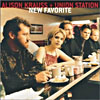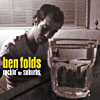
This Week: A country songbird, a restless creator and a curmudgeon
Alison Krauss & Union Station

New Favorite (Rounder)
Gillian Welch
Time (The Revelator) (Acony)
Alison Krauss and Gillian Welch were well-known long before they teamed up on the soundtrack to O Brother, Where Art Thou? But the multi-million-selling success of that album has given everyone involved a boost of name recognition that goes far beyond the bluegrass-Americana realm. So the latest releases from the two folk-country divas (if there is such a thing) represent a career-building chance that few critic's darlings ever get.
Both of them capitalize on the opportunity, but in very different ways. Although they share a love of traditional American music and an affinity for that high lonesome sound (evident on their O Brother duet "I'll Fly Away"), Krauss and Welch really draw from distinct and separate traditions.
New Favorite continues along the path set by Krauss' last few releases. Mostly traditional in instrumentation and propelled by her top-notch band, it is nevertheless really a pop collection—"adult contemporary" bluegrass, if you will. The songs are well chosen as usual, and as usual are dominated by heartbreak ballads with a handful of fiery breakdowns thrown in. It may be tempting to connect some of the tracks with Krauss' recent divorce, but she has always been drawn to the blue side—her powerful but delicate voice, its bright timbres dancing on deep dark waters, was made for sorrow.
The title track is one of the highlights—you can almost hear Krauss fading from her cheating lover's memory. By the end of the song, she sounds like a ghost. Not surprisingly, it was written by Gillian Welch and David Rawlings. And there you have the significant difference between Welch and Krauss: Krauss is a country songbird, while Welch is a singer-songwriter of the folk school. And while New Favorite is a classy but predictable entry from a singer who is arguably tasteful to a fault, Time (The Revelator) is a major achievement for a restless, full-blooded creator.
Welch and her husband/partner Rawlings take the template of her first two albums—neo-traditional folk music notable as much for its sometimes labored "authenticity" as the sharpness of the songwriting—and rewire it for the 21st century. They haven't gone rock, exactly (although the funniest song is called "I Want to Sing That Rock 'n' Roll"). We're still talking acoustic guitars, banjos and Appalachian harmonies. But nothing about Time (The Revelator) sounds dated. Welch is no longer just invoking the spirit of dead Okies or coal miners—she's applying that music, that hard-edged view of a hard world and those soaring heaven-bound melodies, to the life she has lived herself and the world she has seen.
Some of the songs ("Dear Someone," "Red Clay Halo") still sound timeless, but they're all rooted in a complex and idiosyncratic vision, in which religious and cultural symbols (halos and pearly gates, Elvis and the Titanic) are reimagined. Some tracks, particularly the elliptical diptych "April the 14th Part I" and "Ruination Day Part 2," are allusive and elusive in a manner that recalls Bob Dylan or Leonard Cohen: "When the iceberg hit, wasn't much to know/ God moves on the waters like Casey Jones."
The album ends with that rare thing—a 14-minute song ("I Dream a Highway") that never flags or even feels prolonged. It's a deceptively ambitious capstone to a deceptively ambitious album.
—Jesse Fox Mayshark
Ben Folds

Rockin' the Suburbs (Epic)
Rest assured, Ben Folds sounds about the same—nasal, earnest, too smugly clever at times, syncopated, and still able to capture Byzantine emotions with one infuriatingly simple couplet hung on the backbeats of his flashy keyboard licks. Rockin' the Suburbs continues where the Five (well, Two, technically) got off the Ben Folds' bus, and, while Robert Sledge and Darren Jessee's wacky, occasionally inspired bass and drum textures are missing here, Folds ably fills their spaces with a kind of quiet maturity that may be what ties this album together.
It shouldn't be a surprise, really, since our Ben's had a busy couple of years, from finding true love to moving Down Under to testing his solo skills. Suburbs feels both lyrically and sonically like Folds unearthing more wreckage from his 20s, minutely examining it, and generally apologizing for it, which harks back to 1999's Unauthorized Biography of Reinhold Messner. But where that disc got mired in Folds obsessive self-flagellation, in Suburbs it makes for some great songs, like the catchy opener "Annie Waits" or the kiss-off of "Gone." What also helps is that Folds' analysis has become wider, providing almost full-color snapshots of some of the folks who people his world, whether they exist in real life, or simply in his head, like the bouncy "Zak and Sara" or the elegiac "Carrying Cathy." And the curmudgeonly Folds has written a haunting love song that elegantly closes out the album.
Lest one think that any of Folds' former goofball charm is buried under a thin veneer of grown-up respectability, the title track is a bubbly and snide swipe at pop music that borrows its sarcastic overtones from old BFF material and improves on it. Now, Folds is a little bit smarter, a little bit older, and a whole lot more selective—and the whole disc adds up to a fine 50 minutes of music that don't skimp on energy, skill, or heart.
—Adrienne Martini

September 13, 2001 * Vol. 11, No. 37
© 2001 Metro Pulse
|